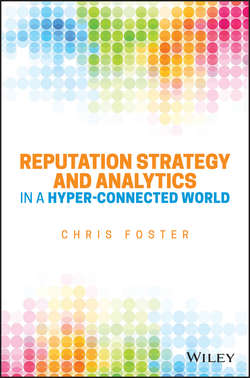Читать книгу Reputation Strategy and Analytics in a Hyper-Connected World - Foster Chris - Страница 10
На сайте Литреса книга снята с продажи.
Introduction
Prediction Is Key to Better Outcomes
ОглавлениеBig data and real-time analytics create essential capabilities for modeling, comparing, and predicting outcomes of reputational issues. I recently led an engagement in which an interdisciplinary team of experts generated real-time predictive indicators of reputational impact for a client and tested multiple scenarios for how to address a situation based on our Reputation Analytics Framework (Figure I.2). We also created a reporting framework that helped our client understand their reputation globally and develop strategies for protecting and enhancing their reputation over time.
Figure I.2 Reputation Analytics Framework
Over the course of the engagement, we performed research, data integration, data/driver analysis (predictive and descriptive), strategy development, and change management analysis. The results of our work provided visibility into resource allocation and critical insights that informed future situations.
We took the following action steps:
● Developed an early warning system to let our client know which stakeholders in what markets would be affected by specific aspects of their reputation.
● Customized and delivered our Reputation Intelligence Model to:
● Integrate the wide range of data streams we identified so that our client could understand stakeholder relationships and their causes.
● Align program initiatives with corporate strategic objectives to indicate impact and assist with strategic planning and efficacy analysis.
The engagement reinforced my belief that successful implementation of data analytics involves various departments and functional areas of the modern enterprise working in close collaboration. It includes departments like IT, communications, operations, human resources; functions like data science and business strategy; and subject matter experts.
The key word is collaboration. Experience shows that the total is always more than the sum of its parts.
Addressing reputational challenges successfully requires:
● Building a framework to enable reputation to be used as a strategic advantage with customers, governments, partners, and employees.
● Monitoring, evaluating, analyzing, and responding appropriately in real time.
● Predicting where and how communications will have an effect on reputation (for example, crisis life cycle, regression analysis).
● Learning how to allocate resources appropriately to gain maximum Reputation Strategy advantage.
While it is possible to outsource certain components of Reputation Strategy, companies should also consider developing their own internal expertise and experience.
